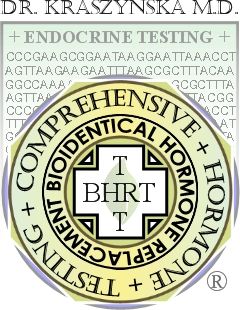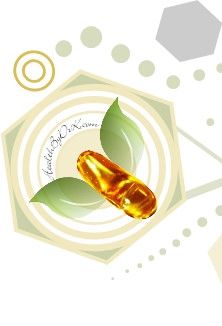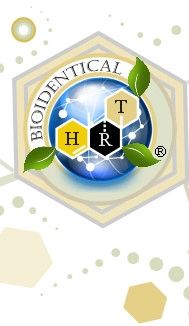MyBioidenticalHormones.com
Balancing hormones...
to regain...
a paramount quality of life™
1-847-253-0557
Attaining hormonal balance, normal testosterone levels in men.
Environmental factors can affect adequate production of the
hormone testosterone and normal testosterone levels in men.
Stress, weight, diet and physical activity influence testosterone.
 Other factors that affect testosterone production are:
Other factors that affect testosterone production are:
Increased physical activity and strenuous exercise burns more testosterone and can create testosterone depletion.
Intense emotional stress decreases the release of luteinizing hormone LH from the pituitary gland and therefore decreases normal testosterone levels in men. Positive emotions including happiness, contentment and a sense of appreciation can enhance testosterone secretion. Foods high in protein and saturated fat increase testosterone production.
Simple carbohydrates and fiber can decrease testosterone production.
The condition of one's environment can significantly affect hormonal balance in both men and women. Unfortunately environmental factors are often not taken into consideration or are entirely disregarded in the assessment of one's hormonal health.

Environmental factors that influence testosterone levels comprise of:
1. Diet and testosterone, the "Testosterone Diet"
The "Paleolithic Diet" also known as "Paleo Diet", "Hunter-Gatherer Diet", "Cavemen Diet" or "Stone Age Diet" is considered to provide the greatest benefits for the health of the endocrine system and experts believe that this diet can help maintain optimal hormonal balance. The Paleolithic Diet consists mostly of vegetables, fruits, tree nuts, meat, eggs and fish. The Paleolithic Diet avoids the consumption of grains, dairy, simple carbohydrates, alcohol and caffeine. This diet is based on the concept that humans are genetically adapted to the diet of their ancestors. This theory of ancestral dieting suggests that because human genetics have barely changed since the beginning of early agriculture, the human body is not adapted to many modern foods and consumption of such can adversely affect genetic expression and manifest itself as gastrointestinal disorders, cardiovascular complications and hormonal imbalances. Therefore it is advisable to consume the foods our Paleolithic ancestors ate.
 Carbs can slow testosterone production and lower testosterone levels
Carbs can slow testosterone production and lower testosterone levels
Eating an excess of simple carbohydrates, starches and simple sugars can lower testosterone levels. This is because carbohydrates (such as those from, potatoes, corn, grains and rice) boost production of the hormone cortisol and insulin that counteract testosterone release. Altering with fruits and vegetables instead of carbohydrates in your diet will offset this effect.
It is essential to ensure an adequate intake of high quality protein in your diet. When protein is digested and absorbed by the body it activates anabolic responses needed for healthy muscle development. Proteins also stimulate production of glucagon (the hormone involved in the metabolism of carbohydrates). These dietary factors are important for normal testosterone secretion.
Balance your intake of saturated fats (sometimes called the bad fat) and supplement with high quality omega 3 essential fatty acids (the good fat). Omega 3 essential fatty acids also known as "omega 3s" are in the family of unsaturated fatty acids. A balance of omega 3 essential fatty acids along with saturated fats is needed for normal testosterone production. All steroid hormones including testosterone are produced from cholesterol. Saturated fats provide the cholesterol the body requires for the healthy composition of testosterone. If one’s diet is insufficient in these saturated fats, then the production of major steroid hormones including testosterone will be adversely affected.

Healthy cholesterol levels and normal testosterone production
Younger men whos bodies have normal ability of testosterone production benefit from adequate intake of cholesterol that is a precursor to testosterone. However if older men going through andropause or male menopause will not modify their cholesterol intake, they may notice higher blood cholesterol levels. This is due to the fact that men during andropause do not transform all their cholesterol into testosterone since the production of testosterone decreases during andropause. Younger obese men usually have lower testosterone production.
In order for a diet to yield positive health benefits on the body and ensure normal testosterone levels, all aspects of the diet must be balanced and supplemented in moderation. Ongoing research shows that an ideal testosterone diet is one that revolves predominantly around the consumption of quality proteins while limiting carbohydrate intake and supplying a modest amount of fats.
2. Weight and testosterone, testosterone production
Fat tissue contains high levels of the enzyme aromatase that converts testosterone into estradiol. This means that men who have higher fat concentrations in their body also have elevated estradiol levels. One clinical study conducted in 2006 measured the testosterone levels in over 2,000 men with an average age of 52. The researchers discovered that obese men were 2.4 times more prone to have low testosterone as oppose to men who maintained a healthy weight. Other clinical trials have also confirmed that as a man’s fat mass increases, his testosterone levels decrease. In essence, slimmer men have more testosterone.
3. Stress and testosterone, normal testosterone levels
Excessive chronic stress increases levels of cortisol and decreases levels of testosterone. Strenuous physical activity has a similar effect. Certain natural stress relief supplements have been know to assist the body to deal with the burden of high stress levels. In addition, testosterone levels are affected by different social events. It has been noted that testosterone levels increase during competition or sports, even for the observers and those not directly involved in the event. However, the individuals who loose the competition have their testosterone levels decline.




















